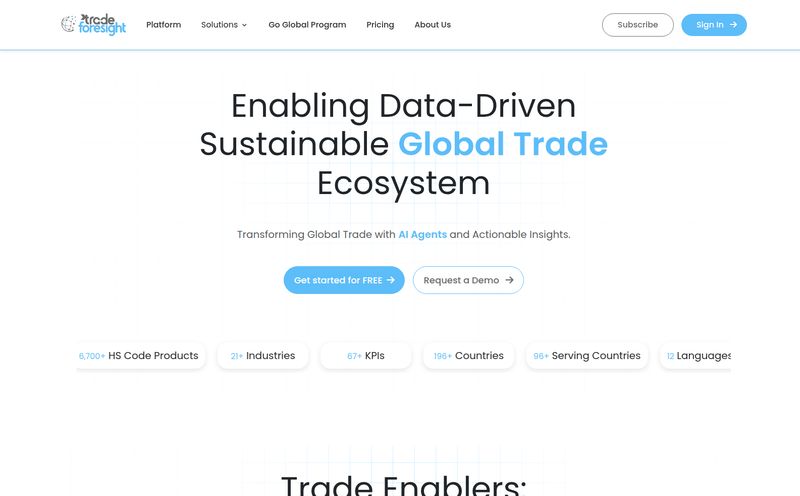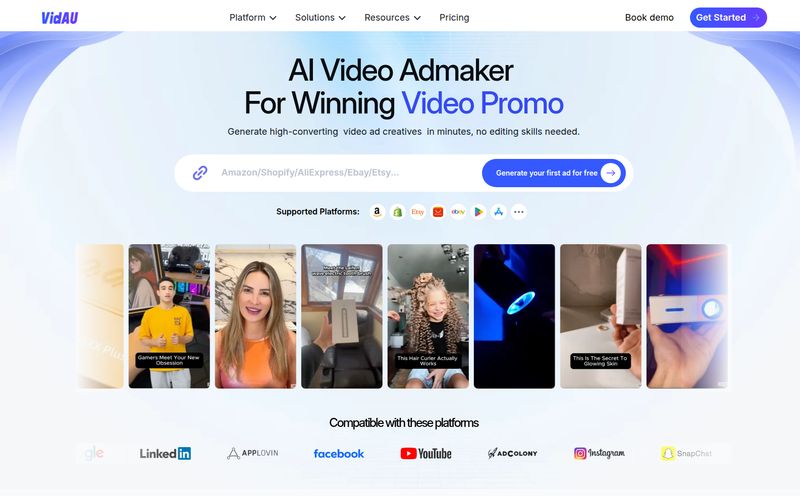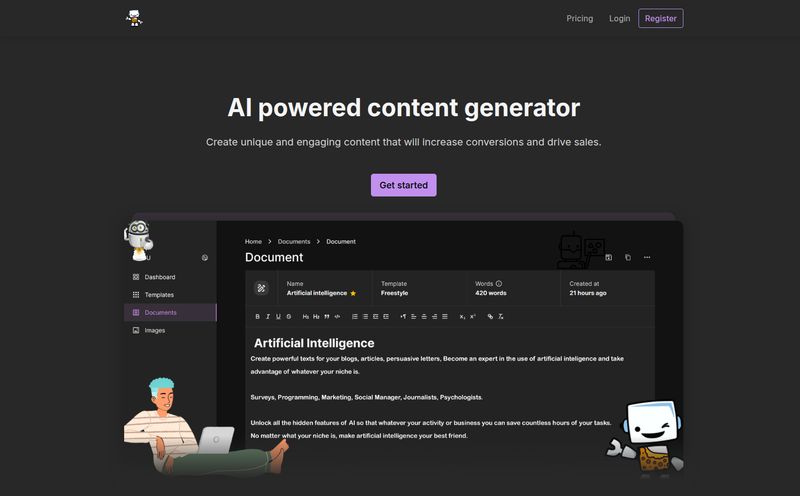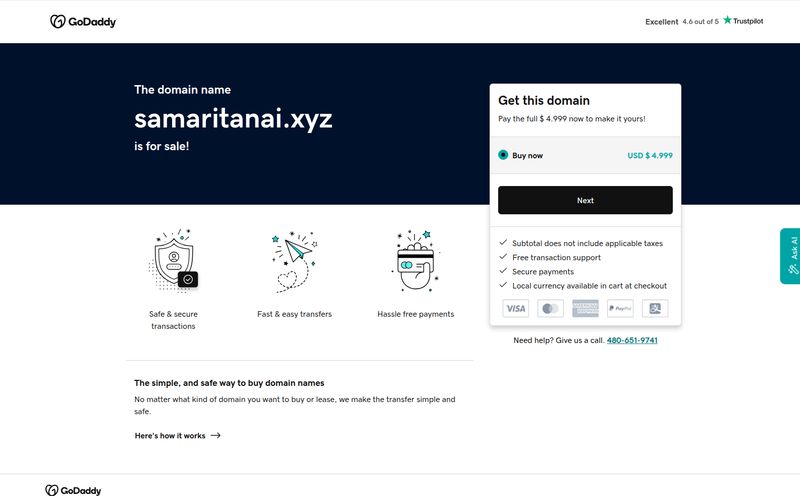Another Tuesday, another dollar spent on an ad campaign that felt right but didn't deliver. Sound familiar? For years, we've been running on a cocktail of gut feelings, A/B tests, and last-click attribution models that tell us half the story. We're practically throwing spaghetti at the wall to see what sticks, and frankly, my wall is getting pretty messy. And expensive.
We're drowning in data, yet starving for wisdom. We know what users did, but what we desperately need to know is what they're about to do. It's the holy grail of marketing, isn't it? To know who's just browsing and who's pulling out their credit card.
I've been hearing some chatter about a platform called Almeta ML that claims to do just that. It's not another analytics dashboard. It's a predictive platform. It promises to use machine learning to peek into the future of user behavior. Big promises. So, naturally, I had to see what was under the hood.
So, What is Almeta ML, Really?
Let's get one thing straight: Almeta ML isn't just a fancier Google Analytics. Think of it less like a rearview mirror and more like a GPS for your customer's journey. Instead of just reporting on past events—clicks, page views, purchases—it analyzes real-time user actions to predict future ones.
It's designed to answer questions that keep us up at night:
- Which of these 10,000 site visitors is actually going to buy something?
- Is this loyal customer about to churn?
- What's the absolute best time to send that promotional email to Jane Doe?
- What product should I recommend to John Smith to increase his cart value?
By processing events on your site in real-time (think 'add to cart', 'viewed product', 'scrolled 75% of the page'), it builds a probabilistic score for various outcomes. It's like having a tiny data scientist for every single user, whispering insights in your ear.
The Features That Actually Matter to Marketers
I've seen a million platforms with a million features. Most are just noise. But a few things about Almeta ML caught my eye, and they seem genuinely built for people who live and breathe ROAS and LTV.
Real-Time Predictions, Not Yesterday's News
The term “real-time” gets thrown around a lot. Often, it means “updated every few hours.” Here, it seems to mean it. The platform is built to calculate things like the probability of a user closing the page in the next 10 seconds. That's fast. This speed means you can trigger actions—like a pop-up offer or a personalized banner—while the user is still in that critical decision-making window, not an hour after they've left and started making dinner.
Actionable Insights You Can Instantly Use
Data without action is just a database. Almeta turns its predictions into concrete metrics you can feed directly into your campaigns. We're talking about things like Lead Scoring to prioritize your sales team's efforts, Send Time Optimization (STO) to hit inboxes at the perfect moment, and identifying users with a high likelihood to purchase. You can literally build an audience in Facebook or Google Ads made up only of people Almeta has flagged as 'highly likely to convert'. That’s powerful stuff.
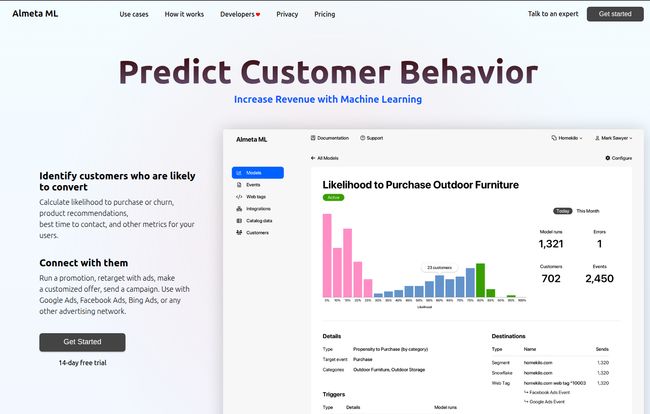
Visit Almeta ML
Integrations That Don't Require a PhD
A tool is only as good as its ability to play nicely with others. The biggest headache with new tech is the integration nightmare. Almeta ML seems to get this. It's built to send its predictive scores and segments directly to the places we actually use them: Google Ads, Facebook Ads, TikTok Ads, Shopify, Klaviyo, you name it. This closes the loop. It’s not just insight; it's insight piped directly to the point of action. That means less time exporting CSVs and more time building better campaigns.
A Privacy-First Approach in a Post-Cookie World
Okay, let's talk about the elephant in the room: privacy. With Google officially phasing out third-party cookies, any tool still relying on them is living on borrowed time. This is where Almeta ML genuinely impressed me.
Their approach is privacy-by-default. It doesn't use cookies unless you tell it to. It doesn't slurp up personal customer data unless you specifically choose to include it. This is a massive deal. It means you can get powerful predictive insights without stepping on the landmines of GDPR and CCPA. It’s future-proofing your marketing stack, and honestly, it shows a level of foresight that gives me confidence in their team.
The All-Important Question: What's the Price Tag?
Alright, this is where the rubber meets teh road for most of us. You can have the best tool in the world, but if it costs more than a small car, it's a non-starter. Almeta ML has a tiered, usage-based model that seems pretty reasonable.
| Plan | Price (Monthly) | Key Features |
|---|---|---|
| Basic | $99 /month | 10,000 model calculations, 100,000 events, 60 days data storage. Good for getting started. |
| Standard | $399 /month | 100,000 model calculations, 1,000,000 events, 90 days data storage. For growing businesses. |
| Enterprise | Volume Pricing | On-premise option, expert installation, SSO, advanced permissions. For the big players. |
Note: They offer two months free if you pay annually, and all plans come with a 14-day free trial. The pricing is based on 'events' (pieces of user behavior data) and 'model calculations' (how many times you run a prediction). It's a fair way to scale. You pay for what you use.
My Honest Take: The Good and The Room-for-Growth
No tool is perfect. Let's be real. After digging in, here's my balanced view.
On the plus side, the predictive power is undeniable. Moving from reactive to proactive marketing is a game-changer. The ease of integration and the focus on ROI are huge wins. And I can't overstate how important that privacy-first stance is. It’s a massive green flag.
However, there are a couple of things to be aware of. First, the accuracy of any machine learning model depends entirely on the quality of your data. Garbage in, garbage out, as they say. You need to have your event tracking set up correctly for Almeta to work its magic. Second, while they have a host of powerful pre-built models, the ability to bring your own custom ML models is still on the 'coming soon' list. For most of us, the pre-built ones are more than enough, but for data science teams wanting full customisation, that's something to keep an eye on.
Is Almeta ML Right for You?
So, who is this for? In my opinion, if you're an e-commerce manager, a performance marketer, or a PPC specialist spending a significant amount on ads and feeling the pinch of rising CPCs, this could be your new best friend. It's for anyone tired of guessing and ready to make data-driven predictions about what their customers will do next.
It's a step up from basic analytics. It requires a bit of a mindset shift, but the potential upside—higher ROAS, better personalization, and lower churn—is enormous. It feels like one of those tools that, in a few years, we'll wonder how we ever lived without.
Frequently Asked Questions
- 1. How does Almeta ML actually work?
- It uses a lightweight tracking tag on your site to collect anonymous user behavior events (like clicks, scrolls, views). It then feeds this real-time data into its machine learning models to predict future actions, like the likelihood of a purchase or churn. You then send these predictions to your marketing platforms to take action.
- 2. How accurate are the predictions?
- The accuracy depends on the quality and volume of your data. The more relevant event data it has, the better the predictions become. Like any ML system, it learns and improves over time. It's about probabilities, not certainties, but it gives you a massive statistical edge.
- 3. Is it difficult to integrate with my website?
- From what I've seen, the basic setup is pretty straightforward, especially if you're familiar with adding tracking scripts like the Google or Facebook pixel. You install a web tag or use their pre-built integrations. For more complex custom workflows, you might need a developer's help, but the core setup is designed to be user-friendly.
- 4. What about data privacy? Does it use personal information?
- This is a key feature. By default, Almeta ML does NOT track any personally identifiable information (PII) and doesn't use cookies. It focuses on anonymous behavioral patterns. You have the option to include customer data from your own systems if you wish, but its core functionality is designed to be privacy-compliant from the ground up.
- 5. What kind of results can I realistically expect?
- Some of their customer testimonials mention seeing ROAS more than double in a month on retargeting campaigns. The goal is to make your existing marketing spend more efficient. By focusing your budget on users with the highest purchase intent and taking proactive steps to retain at-risk customers, you should see improved conversion rates and customer lifetime value.
